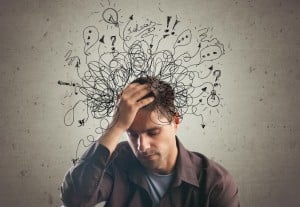Anxiety and Sexual Performance

How can we define anxiety?
Anxiety can be defined as a feeling of apprehension and fear characterised by physical, psychological, and cognitive symptoms. In the context of stress or danger, these reactions are normal. However, some people feel extremely anxious with everyday activities, which may result in distress and significant impairment of normal activity.
You’re no doubt well aware of the fact that stress isn’t good for you. Unfortunately, stress doesn’t just impact your mindset, it can impact you physically as well.
If that doesn’t convince you that you need to try to chill out more on a regular basis, this might: stress can have a big impact on your sex life, too.
One of the stress mechanism is via hormones. Chronic stress can cause your body to produce too much of the hormone cortisol, which can lower your libido. Also, low levels of testosterone can cause a loss of libido.
Mental health conditions like stress and anxiety can also affect how your brain signals your body’s physical response. In the case of an erection, stress and anxiety can interrupt the messages your brain sends to the penis to allow extra blood flow.
Psychological erectile dysfunction (mainly nervousness and anxiety) affects about 90% of teenagers and young men. These events are fairly short-lived.
Personal stress, such as relationship trouble, is the main reason for erectile dysfunction in middle-aged men.
Physical impotence is the most common cause for older men, but the loss of a partner and loneliness can also cause psychological stress.
One study of veterans with posttraumatic stress disorder (PTSD) found that PTSD increased the risk of sexual dysfunction by more than three times. Long-term stress and anxiety can increase certain hormone levels in your body and interfere with your body’s processes. This can also lead to other health conditions that may cause erectile dysfunction.
Is it normal to be anxious?
Experiencing occasional anxiety is a normal part of life. However, people with anxiety disorders frequently have intense, excessive and persistent worries and fears about everyday situations. Often, anxiety disorders involve repeated episodes of sudden feelings of intense anxiety and fear or terror that reach a peak within minutes (panic attacks).
These feelings of anxiety and panic interfere with daily activities, are difficult to control, are out of proportion to the actual danger and can last a long time. You may avoid places or situations to prevent these feelings. Examples of anxiety disorders include generalized anxiety disorder, social anxiety disorder (social phobia), specific phobias and separation anxiety disorder. You can have more than one anxiety disorder. Sometimes anxiety results from a medical condition that needs treatment.
Symptoms may start during childhood or the teen years and continue into adulthood.
How can anxiety affect your sexual performance?
When you feel anxious, your body releases powerful stress hormones such as epinephrine (also called adrenaline) and norepinephrine. These hormones constrict blood vessels, reducing blood flow to parts of your body such as your penis.
This makes it much harder than normal to develop and keep an erection, affecting your ability to enjoy sex with your partner. Simply put, the psychological effects of performance anxiety lead to a physical response from your body that makes sex more difficult.
This means that even men with none of the main physical causes of erectile dysfunction (ED) can have trouble getting an erection if they feel anxious or nervous before sex.
Common anxiety signs and symptoms include:
- Feeling nervous, restless or tense;
- Having a sense of impending danger, panic or doom;
- Having an increased heart rate;
- Breathing rapidly (hyperventilation);
- Sweating;
- Trembling;
- Feeling weak or tired;
- Trouble concentrating;
- Having trouble sleeping;
- Experiencing gastrointestinal (GI) problems;
- Having difficulty controlling worries;
- Having the urge to avoid things that trigger anxiety.
How can it be treated?
Treatment for psychological causes of ED typically involves therapy.
Therapy can help you break out of the stress or anxiety and ED cycle. Different forms of therapy include:
- Counselling: You’ll work with a therapist to identify and address major stress or anxiety factors, so you can manage them;
- Psychodynamic therapy: This usually involves addressing a subconscious conflict to help find the root cause of your ED;
- Sex therapy: This therapy focuses on sensational pleasure rather than arousal and sexual activity. It aims to reduce the stress factor by building more a secure and reliable sex life;
- Sexual anxiety therapy: Your doctor will explain ED to you in full detail. This can help reduce problems and worries caused by a lack of knowledge. Then your doctor will address the emotional issues and help you find a solution. Solutions may vary from trying to achieve relaxation to reactivating imagination.
Alternative therapies may also help with stress and anxiety. Modern treatments include:
- Relaxation techniques;
- Meditation;
- Yoga;
- Acupuncture.
These treatments may help you manage your stress and anxiety levels. Research shows that meditation can change brain chemistry and reduce stress. But there is less evidence supporting the effectiveness of these alternative treatments compared to traditional therapies and medications for stress and anxiety. However, they may provide additional benefits alongside the treatments your doctor prescribes.
What is the prevalence of sexual dysfunction in anxious males?
Sexual dysfunction (SD) has been reported in 40%–65% of patients with major depressive disorder. The relationship between SD and major depressive disorder is bidirectional, with SD increasing the risk of depression and vice versa.
Approximately 35%–45% of antidepressant-treated patients experience global SD, with 60%–80% of patients reporting decreased functioning in a specific phase of the sexual cycle.
Comorbid depressive and anxiety disorders are often seen in clinical settings, and like depression symptoms, anxiety can be a prominent factor in the aetiology of SD.
Deficits in different phases of the sexual functioning cycle may vary across psychiatric disorders. Decreased libido is the most commonly reported problem in depressed patients, although problems with arousal, ED, and absent or delayed orgasm are also prevalent.
In a study of 80 people with social and without an anxiety disorder, men with the disorder were found to have moderate impairment in sexual arousal, orgasm, enjoyment, and satisfaction. In addition, men with a social anxiety disorder were more likely to have paid for sex.
If you are anxious, you can’t be present
People who have anxiety often find it difficult to be fully present for many things in life, including sex.
Anxiety doesn’t allow you to be present during sex. It doesn’t even allow you to have erotic thoughts and responses since your mind is often preoccupied.
When people have anxiety, they spend a lot of time in their head. Sex means pleasant feelings in your body. If you are disconnected, you can’t enjoy it and you can make it harder for your partner too.
Anxiety causes low libido
If you’re anxious, the thought of sex will be nerve-wracking as opposed to arousing. Anxiety causes the mind to focus on the negative and it is difficult to overcome them with positive emotions such as sexual desire. This can lead to low libido.
It makes you feel tired
Those who have anxiety often report that they have trouble sleeping, which can impact how sexual you feel. One symptom of anxiety is fatigue, which may be due to poor sleeping habits or insomnia. Being tired all the time makes the desire to have sex even more difficult.
It affects your relationship
This is probably the hardest part for many people when it comes to their anxiety. The toll it can take on your sex life and what that means for your relationship is a tough pill to swallow.
If you have daily anxiety about general life stresses you don’t have space to work on your relationship and good relationships need time and effort. Anxiety is mentally exhausting and who wants to make time for sex and relationships when they are exhausted.
Additionally, the lack of sex and romance can create a rift. Anxiety can make it difficult to even enjoy your partner and their romantic gestures. When in a state of panic, individuals often want to be left alone and not touched which causes distance in the relationship.
It could cause intimacy issues
Anxiety can have a significant effect on intimacy. It’s hard to be in the moment and enjoy sensual, intimate moments when your mind is constantly racing, and pulling you either back to the past or ahead to the future.
On the flip side, this challenge provides couples with an opportunity to explore other ways of being intimate with one another. If sex isn’t possible for you now, engage in other romantic gestures.
Talking to a therapist alone or together may be a good option because anxiety shouldn’t make you feel ashamed. If you get treated and work on the sex component, the issues you’re facing may just be a temporary bump in the road on your way to bedroom bliss.
Anxiety makes it more difficult to orgasm
Clenched muscles, shallow breathing, goosebumps, these and other physical symptoms of anxiety block you from letting go and reaching climax. The condition “can raise your ‘orgasmic threshold,’” which is another term for how long it takes or how much stimulation you need to reach orgasm.
It can also put the brakes on lubrication, make flexing and bending your body uncomfortable, and even trigger vaginismus, a disorder that makes your vaginal muscles so tense and contracted, penetration is impossible. These physical changes, coupled with anxious thoughts, can further mess with your awareness of physical sexual stimulation, which inhibits orgasm.
What is sexual dysfunction in males?
SD is any physical or psychological problem that prevents you or your partner from getting sexual satisfaction. Male SD is a common health problem affecting men of all ages but is more common with increasing age. Treatment can often help men suffering from SD.
The main types of male SD are:
- ED (difficulty getting/keeping an erection);
- Premature ejaculation (reaching orgasm too quickly);
- Delayed or inhibited ejaculation (reaching orgasm too slowly or not at all);
- Low libido (reduced interest in sex).
How is male SD diagnosed?
Your doctor may begin the diagnosis process with a physical exam. Physical tests may include:
- Blood tests to check your testosterone levels, blood sugar (for diabetes), and cholesterol;
- Blood pressure check;
- A rectal exam to check your prostate;
- Examination of your penis and testicles;
- Other tests can show if you have problems with the nerve impulses or blood flow to the penis.
Your doctor may also ask questions about your symptoms and your medical and sexual history. Though these questions may seem very personal, do not be embarrassed. It is important to answer honestly so the best treatment can be recommended. You may be sent to a different type of doctor (urologist, endocrinologist or sex therapist, for example) who can help you.
How is male SD treated?
Most types of SD can be corrected by treating the underlying physical or psychological problems. Other treatment strategies include:
- Medication. When a medication is the cause of the dysfunction, a change in the medication may help. Men and women with hormone deficiencies may benefit from hormone shots, pills, or creams. For men, drugs, including sildenafil (Viagra), tadalafil (Cialis), vardenafil (Levitra, Staxyn), and avanafil (Stendra) may help improve sexual function by increasing blood flow to the penis.
- Mechanical aids. Aids such as vacuum devices and penile implants may help men with ED (the inability to achieve or maintain an erection).
- Sex therapy. Sex therapists can be very helpful to couples experiencing a sexual problem that cannot be addressed by their primary clinician. Therapists are often good marital counsellors, as well. For the couple who wants to begin enjoying their sexual relationship, it is well worth the time and effort to work with a trained professional.
- Behavioural treatments. These involve various techniques, including insights into harmful behaviours in the relationship, or techniques such as self-stimulation for treatment of problems with arousal and/or orgasm.
- Psychotherapy. Therapy with a trained counsellor can help a person address sexual trauma from the past, feelings of anxiety, fear, or guilt, and poor body image, all of which may have an impact on current sexual function.
- Education and communication. Education about sex and sexual behaviours and responses may help an individual overcome his anxieties about sexual function. Open dialogue with your partner about your needs and concerns also helps to overcome many barriers to a healthy sex life.
Can male SD be prevented?
While male SD cannot be prevented, dealing with the causes of the dysfunction can help you better understand and cope with the problem when it happens. To help maintain good sexual function:
- Follow your doctor’s treatment plan for any of your medical/health conditions;
- Limit your alcohol intake;
- Quit smoking;
- Get treatment if needed for any emotional or psychological problems such as stress, depression, and anxiety;
- Communicate better and more often with your partner.
Communication with your partner
If you have any type of sexual dysfunction, talk to your partner. Don’t hesitate to seek medical advice. A bad night does not mean a disaster. It’s normal not to be in the mood sometimes. Sexual dysfunction happens to most people at one time or another. If it becomes an ongoing problem, you should seek help.
Talking about SD can be a first step in managing this affection and keeping control over it. Speaking about SD with your partner is an act of caring and sharing your feelings. There are many men suffering from this condition and there should be a focus on resolving the problem, not just talking about it or hide it. Open communication is the way to manage this affection and overcome it, together.
What is essential in the discussion with your partner
First, the fact that SD can be managed with the right treatment. It is not the end of the world that this happened. SD can affect any men, at any age, dependent or not of organic causes. Your partner must be aware that SD is not something incurable or permanent.
Final thoughts…
Remember that you’re more likely to experience sexual dysfunction if you abuse alcohol or drugs. SD can be related to age but also with a man’s lifestyle. Smoking, obesity, drug and alcohol abuse, an unhealthy diet, and poor exercise habits can contribute to other health conditions associated with SD.
Also, before taking a new medication, learn about the potential side effects. You should take them only as directed.
One must admit that, when it comes to sex, it can be somewhat difficult to keep up the record. We all encounter some failures, at some time in life.
References
- http://www.psychiatrictimes.com/anxiety/relationship-between-anxiety-disorders-and-sexual-dysfunction;
- https://www.forhims.com/blog/sexual-performance-anxiety-and-ed;
- https://www.healthline.com/health/erectile-dysfunction-anxiety-stress#treatment;
- Atlantis E, Sullivan T. Bidirectional association between depression and sexual dysfunction: a systematic review and meta-analysis. J Sex Med. 2012 Jun; 9(6):1497-507. PubMed PMID: 22462756. DOI: 10.1111/j.1743-6109.2012.02709.x;
- Kaplan HS. Anxiety and SD. J Clin Psychiatry. 1988 Oct; 49 Suppl():21-5. PubMed PMID: 3170497;
- Kennedy SH, Rizvi S. Sexual dysfunction, depression, and the impact of antidepressants. J Clin Psychopharmacol. 2009 Apr; 29(2):157-64. PubMed PMID: 19512977. DOI: 10.1097/JCP.0b013e31819c76e9;
- https://www.romper.com/p/how-anxiety-affects-sex-because-the-brain-body-are-connected-59837;
- https://www.health.com/anxiety/anxiety-sex;
- https://my.clevelandclinic.org/health/diseases/9122-sexual-dysfunction-in-males/prevention.




